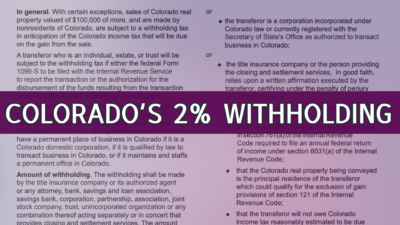
When selling real estate in Colorado, non-resident property owners should be aware of the state’s 2% withholding tax, designed to ensure the collection of income tax on gains from property sales.
When is Withholding Required?
The Colorado Department of Revenue mandates withholding from the sale proceeds if:
-
The seller is a non-resident, and
-
The property sells for more than $100,000.
The title company sends the withheld funds to the Colorado Department of Revenue, where they are credited to the seller’s income tax account as an estimated payment. When filing a Colorado income tax return, the seller can apply this credit toward any tax liability owed. This requirement applies not only to individuals living outside of Colorado but also to corporations without a permanent business presence in the state, as well as out-of-state estates and trusts. This withholding applies to sales of Colorado real property valued over $100,000 when the seller is not a Colorado resident.
How Much is Withheld?
The withholding amount is the lesser of:
-
2% of the total sales price, or
-
The net proceeds from the sale (the amount the seller would otherwise receive on the settlement statement).
The amount withheld is the lesser of 2% of the gross sales price or the net proceeds from the sale.
For example, if a property sells for $200,000 and the seller stands to net $45,000 after expenses, the withholding would be $4,000 (2% of the sales price). Conversely, if the same sale results in only $3,000 net proceeds, the withholding would be limited to that $3,000.
Understanding and navigating Colorado’s 2% withholding tax is essential for non-resident property sellers. By familiarizing themselves with the requirements and potential exemptions, and by seeking professional guidance, sellers can ensure a smooth transaction and compliance with state tax laws.
Are There Exceptions to the Withholding?
At closing, sellers must complete Form DR 1083 (Information with Respect to a Conveyance of a Colorado Real Property Interest). If the seller is a non-resident, withholding may not be required if either of the following applies:
-
There are no net proceeds from the sale, or
-
The seller provides a signed affirmation stating that no Colorado income tax will be owed on the transaction.
Certain exemptions can relieve sellers from this withholding requirement. These include situations where the sales price does not exceed $100,000, the seller is a Colorado resident, the property is the seller’s principal residence qualifying for federal gain exclusion, or the seller affirms that no Colorado income tax will be due on the sale.
Here is a link to a copy of the withholding form: Form DR 1083
What Happens to the Withheld Amount?
The title company sends the withheld funds to the Colorado Department of Revenue, where they are credited to the seller’s income tax account as an estimated payment. When filing a Colorado income tax return, the seller can apply this credit toward any tax liability owed.
If you got value out of this article and are thinking about buying or selling in Crested Butte or Gunnison County? Let’s chat! Whether you’re looking for market insights, a dream home, or the perfect investment, I’m here to help. Call, text, or email me anytime!
Let’s explore your options, connect and make your real estate goals a reality.


